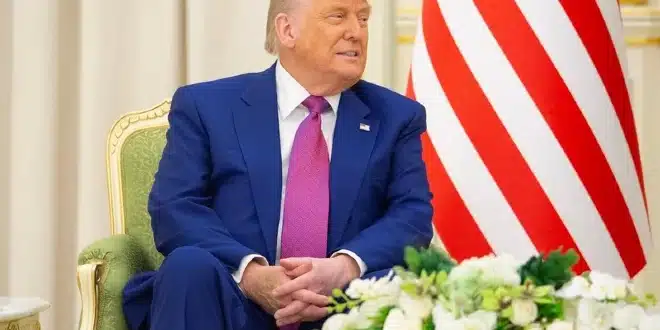Syria’s interim president, Ahmed al-Sharaa, has welcomed the decision by former U.S. President Donald Trump to lift sanctions on the country, describing the move as both historic and bold. Speaking in a nationally televised address, Sharaa said the change in U.S. policy marked a significant turning point for a country long devastated by war and diplomatic isolation. He added that the easing of sanctions would help ease suffering among Syrians and create new opportunities for regional stability and reconstruction.
The announcement comes after a brief meeting between the two leaders in Riyadh, during which Trump offered to relax sanctions originally imposed under the administration of ousted President Bashar al-Assad. These measures had broadly targeted Syria’s economy, financial institutions, and individuals aligned with the Assad regime, with the aim of deterring reconstruction efforts until a political transition was achieved.
Strategic Gains for the United States
The Trump administration’s decision appears designed to serve multiple foreign policy objectives, particularly in the context of Middle Eastern realignment. According to reports from Washington, Trump presented Sharaa with a detailed list of U.S. priorities, including the normalization of relations with Israel, the removal of foreign combatants from Syrian territory, and cooperation to prevent a resurgence of the Islamic State group.
While some of these objectives may be more achievable than others, U.S. officials hope the policy shift will be well received by key regional allies, particularly Saudi Arabia. The decision is also seen as a way to reduce American military involvement in Syria by encouraging the formation of a more stable domestic authority capable of managing its own security concerns.
Analysts suggest that a functioning Syrian government, even in transition, could help the U.S. scale back its troop presence, which was established primarily to assist Kurdish-led operations against Islamic State militants. Ending direct U.S. involvement in Syria has been a stated goal of Trump’s foreign policy, and lifting sanctions may serve as a diplomatic tool to reach that end. Moreover, closer cooperation between Washington and Damascus could pave the way for coordinated actions against both ISIS remnants and Iranian influence in the region.
Economic and Political Prospects for Damascus
For the Syrian leadership, the removal of U.S. sanctions opens up significant economic and political avenues. Since the outbreak of the civil war in 2011, over half a million people have died, millions have been displaced, and the country’s infrastructure has been severely degraded. The United States had previously enforced wide-ranging sanctions, discouraging international investment and warning against efforts to rebuild the country while Assad remained in power.
With those restrictions now loosened, Damascus is expected to benefit from renewed foreign interest, potential capital inflows, and the revival of key sectors such as banking, trade, and construction. Analysts say the move could aid humanitarian efforts and rebuild vital infrastructure, with United Nations estimates placing reconstruction costs at over $400 billion.
In his televised remarks, Sharaa committed to turning Syria away from its role as a battleground for external powers and toward a more open and stable economy. He promised reforms to enhance the country’s investment climate and improve economic legislation. Officials in Damascus now aim to use this moment to attract international support and accelerate recovery efforts.
Obstacles and Unresolved Issues
Despite the optimism surrounding the policy shift, significant challenges remain. Meeting the conditions outlined by Washington will not be straightforward. While some demands—such as expanding cooperation on anti-terror operations—may align with Sharaa’s priorities, others, like severing ties with Iranian-backed militias or normalizing relations with Israel, are far more complex.
The issue of Israel remains particularly sensitive. Syria’s historical conflicts with its southwestern neighbor, ongoing hostilities, and the occupation of the Golan Heights—Sharaa’s ancestral region—complicate the possibility of diplomatic engagement. Additionally, various foreign fighters remain embedded within Syria’s security framework or operate independently under extremist banners, further complicating efforts to reassert central control.
From the U.S. side, implementing the removal of sanctions will involve coordination across multiple government agencies. Analysts note that it will take substantial bureaucratic action, involving departments such as State, Treasury, Commerce, and Congressional committees, to fully operationalize the new policy.
As both countries navigate this new phase in bilateral relations, the long-term success of the initiative will depend on practical implementation, political compromises, and sustained international cooperation. While the lifting of sanctions marks a pivotal shift, the path ahead for Syria’s recovery and reintegration into the global community remains uncertain and heavily contingent on the actions taken in the months to come.


